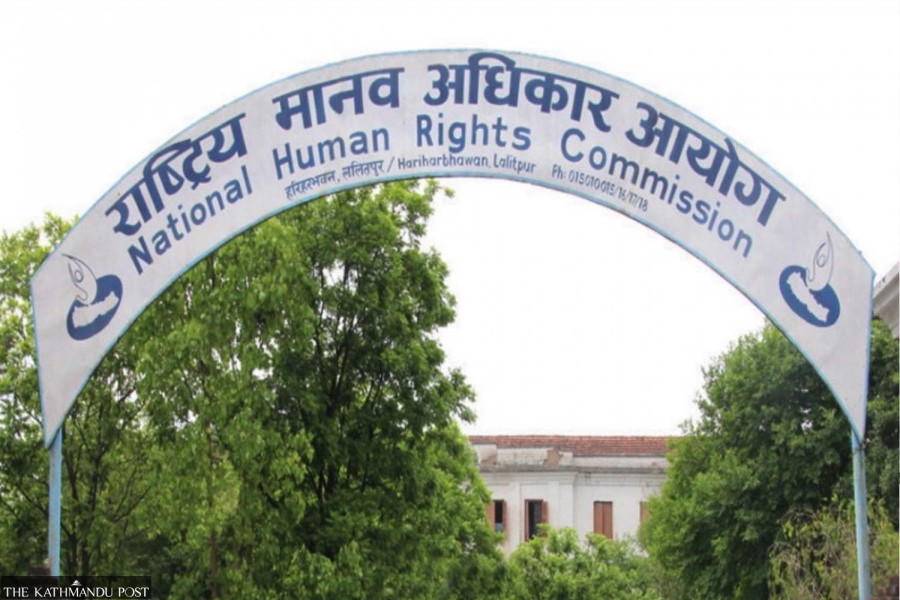National
Recommendation committee can’t award merit in picking transitional justice office bearers, NHRC says
Commission member Manoj Duwadi, who was a member of a former recommendation committee that failed in its duty, argues the panel dominated by the representatives of political parties cannot make a right selection.
Post Report
The National Human Rights Commision (NHRC) has said the selection of office bearers for the two transitional justice commissions on merit is not possible through the present set-up of the recommendation committee.
Explaining the reasons for the failure of the recommendation to pick the office bearers, Manoj Duwadi, a member of the commission, said the recommendation committee dominated by the representatives of the political parties cannot make a right selection.
“Only two in the five-member [recommendation] panel are neutral. Three others act as dictated by their parties,” he said at an interaction held by the commission on Tuesday.
Duwadi was a member of the former chief justice Om Prakash Mishra-led recommendation committee that exhausted its two-month tenure on December 16 without completing its responsibility. It was tasked with recommending a chairperson and four members each for the Truth and Reconciliation Commission and the Commission of Investigation on Enforced Disappeared Persons.
However, it recommended the government start a fresh selection process saying it could not reach consensus in selecting names and recommending names through majority would have lasting implications for the peace process. Other than Mishra and Duwadi, the five-member panel had Arjun Karki, a former ambassador; Khamma Bahadur Khati, former attorney general; and Stella Tamang, a human rights activist.
As claimed by Duwadi, Karki represents the CPN-UML, Khati is a Nepali Congress affiliate and Tamang is close to the CPN (Maoist Centre). The Mishra-led panel, which had finalised the rest of the names, couldn’t agree on the name of TRC chairperson.
The Congress, which has staked a claim to the position, had pushed for Sudip Pathak, a former NHRC member. It had presented former deputy attorney general Biswaraj Koirala and Sher Bahadur KC, a former president of the Nepal Bar Association. Their names were not endorsed by Mishra and Duwadi for their controversial past or for claims that they were incapable to command the position.
“In my personal opinion, the NHRC, if given the responsibility, can select 10 competent office bearers but it is not possible through the present mechanism,” said Duwadi.
The commission held the interaction to seek feedback from the stakeholders amid the uncertainty so as to devise the NHRC’s strategy, according to Surya Dhungel, who is the transitional justice focal point at the commission.
The victims present in the interaction had conflicting views over the role of the selection committee and how the process should move ahead. Ram Kumar Bhandari, coordinator of the National Network of the Victims of Serious Violations of Human Rights, slammed the recommendation committee and Duwadi for failing to fulfil their responsibility.
“You have betrayed us. It was your job to recommend the names. On what legal grounds did you recommend the government start a selection process afresh?” asked Bhandari.
“Why did you stretch the selection process until the last day if you knew the committee could not deliver? You have to refund the allowances you took despite wasting crucial two months.”
Bhandari even blamed the commission for politicising the selection process.
However, other victims opposed Bhandari arguing that it was better not to recommend the name rather than endorsing names taken out of the pockets of political leaders.
“We have already waited 18 years and can wait longer but won’t accept perpetrators at the commissions,” said Shankar Budhathoki, a conflict victim. “Why should we accept whatever names these three party leaders project? Better late than have spoilers in the commissions.”
He thanked the Mishra-led committee for refusing to recommend the names dictated by the parties. The human rights activists also backed Budhathoki saying that the selection committee was successful in shattering the plan of the major parties to appoint the office bearers on political sharing.
“It might take a few more months to select the office bearers but I appreciate how the selection committee dared to refuse to be a rubber stamp of the political parties,” said Charan Prasai, a human rights activist. “The NHRC representative had been betraying [by endorsing the names in the past]. This time he [Duwadi] took a right stand.”
As the Mishra-led panel failed to fulfil its responsibility, there are two options left: form a new recommendation committee or give the Mishra-led committee more time to find the right persons. Though the top leaders of the major parties have discussed the matter informally, they are yet to reach an agreement.
The United Nations Resident Coordinator’s Office and other diplomatic missions too are interacting with the stakeholders on the matter to devise their position.




 11.12°C Kathmandu
11.12°C Kathmandu













